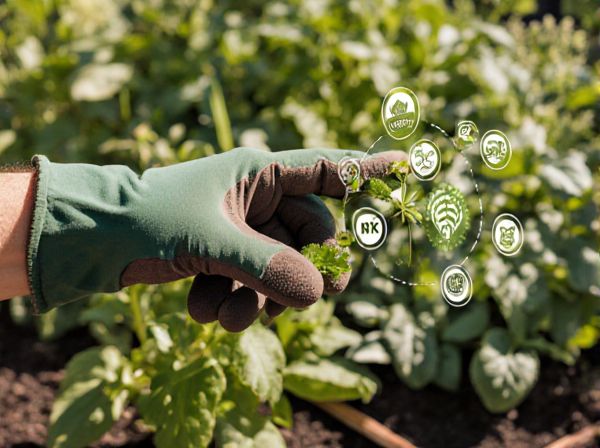
Certified organic seeds vs Conventional seeds Illustration
Certified organic seeds are produced without synthetic pesticides, herbicides, or genetically modified organisms, ensuring a natural and eco-friendly approach to planting. These seeds promote biodiversity and soil health, aligning with sustainable agricultural practices. Conventional seeds, often treated with chemicals for higher yields and pest resistance, may pose risks to the environment and long-term soil fertility.
Table of Comparison
| Feature | Certified Organic Seeds | Conventional Seeds |
|---|---|---|
| Certification | Verified by organic certification bodies (USDA Organic, EU Organic) | No organic certification required |
| Source | Produced without synthetic pesticides, herbicides, or GMOs | May include GMOs and treated with synthetic chemicals |
| Environmental Impact | Supports biodiversity, reduces soil contamination | Possible soil degradation and chemical runoff |
| Seed Treatment | Free from synthetic fungicides and insecticides | Often treated to improve germination and pest resistance |
| Crop Yield | Generally lower but sustainable over time | Higher immediate yields with chemical inputs |
| Cost | Typically higher price due to certification and production methods | Lower price, widely available |
Understanding Certified Organic Seeds
Certified organic seeds are produced without synthetic pesticides, herbicides, or genetically modified organisms, ensuring compliance with strict USDA organic standards. These seeds support sustainable farming by promoting biodiversity, soil health, and non-toxic crop production. Farmers choosing certified organic seeds contribute to environmental conservation and access premium markets demanding organic products.
What Defines Conventional Seeds?
Conventional seeds are typically produced using standard agricultural practices that may involve synthetic fertilizers, pesticides, and herbicides to enhance crop yield and control pests. These seeds are often hybrid or genetically modified to improve traits such as disease resistance, growth rate, and productivity but do not adhere to organic certification standards. Unlike certified organic seeds, conventional seeds may contain chemical residues and lack the strict regulation on sustainable farming methods required for organic labeling.
Key Differences Between Organic and Conventional Seeds
Certified organic seeds are produced without synthetic pesticides, herbicides, or genetically modified organisms (GMOs), ensuring compliance with strict organic farming standards. Conventional seeds often involve chemical treatments and genetic modifications to enhance yield, pest resistance, and shelf life. The key differences lie in production methods, regulatory frameworks, and environmental impact, with organic seeds promoting biodiversity and sustainable agriculture.
Benefits of Using Certified Organic Seeds
Certified organic seeds are non-GMO and free from synthetic pesticides, ensuring healthier crop growth and improved soil biodiversity. These seeds support sustainable farming practices by enhancing soil fertility and reducing chemical runoff, which benefits the environment. Using certified organic seeds also results in higher-quality produce with better nutritional value and consumer trust.
Potential Drawbacks of Organic Seeds
Certified organic seeds may exhibit lower germination rates compared to conventional seeds due to the absence of synthetic treatments and chemical enhancers. Limited availability and higher costs of organic seeds can restrict crop diversity and accessibility for farmers. Additionally, organic seeds might carry a higher risk of seed-borne diseases because of the prohibition of chemical seed disinfectants in organic farming standards.
Comparing Seed Production Methods
Certified organic seeds are produced through environmentally sustainable practices that exclude synthetic pesticides, herbicides, and genetically modified organisms, ensuring biodiversity and soil health. Conventional seeds often rely on chemical inputs and genetically engineered traits to enhance yield and pest resistance, which can lead to soil degradation and reduced genetic diversity. Organic seed production emphasizes crop rotation, composting, and natural pest control, resulting in seeds that support long-term ecosystem balance and farmer autonomy.
Impact on Garden Health and Soil Quality
Certified organic seeds promote garden health by supporting biodiversity and minimizing chemical residue buildup, enhancing soil microbial activity essential for nutrient cycling. Conventional seeds often rely on synthetic fertilizers and pesticides that can degrade soil structure and diminish beneficial organisms over time. Using organic seeds contributes to long-term soil fertility and sustainable garden ecosystems by fostering natural resilience and reducing contamination.
Environmental Considerations: Organic vs Conventional
Certified organic seeds are produced without synthetic pesticides or chemical fertilizers, reducing soil and water contamination and promoting healthier ecosystems. Conventional seeds often rely on chemical inputs that can contribute to soil degradation, water pollution, and loss of biodiversity. Organic seed practices support sustainable agriculture by enhancing soil fertility, conserving natural resources, and minimizing negative environmental impact.
Seed Viability and Plant Performance
Certified organic seeds maintain higher seed viability through sustainable farming practices that avoid synthetic chemicals, resulting in robust germination rates and healthy seedling development. Conventional seeds often rely on chemical treatments that may enhance initial germination but can reduce long-term seed viability and plant resilience. Studies show organic seeds consistently produce plants with stronger disease resistance and improved yield performance under natural growing conditions.
Making the Right Choice for Your Garden
Certified organic seeds are produced without synthetic pesticides, herbicides, or genetically modified organisms, promoting healthier soil and biodiversity in your garden. Conventional seeds may offer higher yields but often rely on chemical treatments that can impact long-term soil health and ecosystem balance. Choosing certified organic seeds supports sustainable gardening practices and enhances the natural resilience of your plants.
Certified organic seeds vs Conventional seeds Infographic

 gardendif.com
gardendif.com